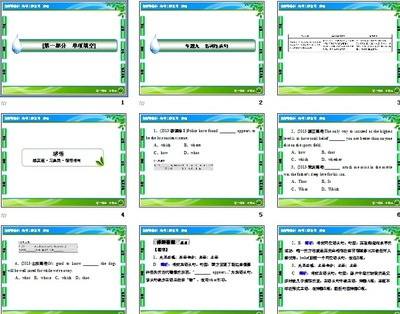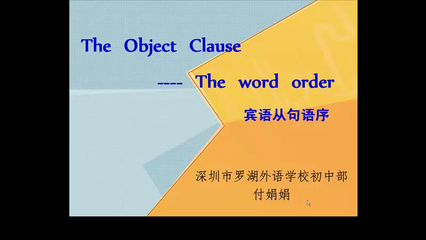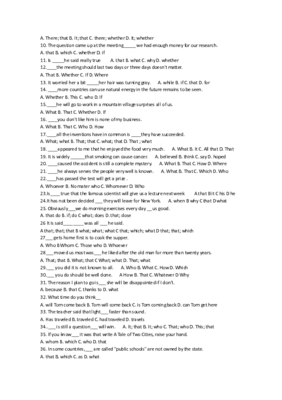what that which 区别
It was Barcelona's sixth win in a row and, thanks to theirBrazilian's 10-goal contribution,____look like a poor season couldnow end a sucess.(what/that/which)
what 和that、which比较
示例:
What I need now is to lie down and have a good rest.
我现在需要的是躺下来,好好地休息一会儿。
关系代词what与that或which不同。that与which通常代替前面的名词,并“重复其意思”:
I gave her the present which she asked for.
我给了她所要的礼物。(在此句中which代表了present)
而what 的含义则是the thing(s) that,故上句可写为:
I gave her what she asked for. (what = the present which)
what作关系代词时相当于the thing which或the thing that,故应当接一个单数形式的动词。
What we need is more motorways.
我们所需要的是更多的公路。
What 和that都可以引导名词性从句。但他们在句子中的语法功能截然不同。
一.在引导名词性从句时,从属连词that一般要注意三个不(three nos):
1.不省略(noellipsis)
当从属连词that引导主语从句、表语从句和同位语从句时,that不省略。
Eg. 1) That he was ableto come made us happy. (That 引导主语从句不可省略)
2)The truth isthat I didn’t go there.(that引导表语从句不可省略)
3)The newsthat our team has won is true.(that引导同位语从句不可省略)
但在非正式文体中that引导宾语从句时可以省略,除下列两种情况外:
that在宾语从句中不能省略的情况.
(1).在主+谓+it(形式宾语)+宾补+that, 从句(真正宾语)的句型中不省略.
Eg: 4) Hemade it quite clear that he preferred to studyEnglish.(that不可以省略)
他很明确地说他宁愿学习英语。
(2). 由连词and连接的两个由that引导 的宾语从句中, 则第二个宾语从句前的that不省略。
Eg: 5)He told me that he would come and that he would come ontime.(第一个That可以省略,但第二个that不可以省略。)他告诉我他将来而且他将准时来。
2.不作成分(nocomponent)
that在名词性从句中不作任何句子成分。
Eg. 6)Sydneykept his promise that he would always do anything he couldfor Lucie to make sure of her happiness.(that在句中引导同位语从句,但在句中不作任何成分)
7))That you don’t like him is none of my business.(that在句中引导主语从句,但在句中不作任何成分,也不省略)
3. 没词义(no meaning)
that在名词性从句中没有汉语意思。
Eg. 8)Thatshe is a rich woman is known to us.(that在句中引导主语从句,但在句中没有汉语意义)
她是一个很有钱的女子,这一点我们都知道。
9)The thought that he mightfail in the exam worried him.(that在句中引导同位语从句,但在句中没有汉语意义)
他也许会考试失败,这一想法使他很担心。
二.在引导名词性从句时,What一般要注意一个不(one no),一个有(meaning),一个作(component):
1.不省略
what引导名词性从句时,what在句中不省略。这一用法与that用法不尽相同。
eg. 10)What I had for breakfast today was rice withegg.(what 在句中引导主语从句,what不省略)
11)----I think it’s going to be a big problem.
----Yes , it could be .
----I wonder what we can do about.(what在句中引导宾语从句,但在句中不省略)
2.有词义
what引导名词性从句时,有词义。一般是“----的东西/事情/话等”这一用法与that 用法不一样
eg. 1) This is what shewanted to show us. (what在句中引导表语从句,在句中有词义,意思是“----的东西、事情)这是她想让我们看的东西。
12)What the teacher saidhad a good effect on the children.(what在句中引导主语从句,在句中有词义,意思是“----的东西、事情)老师所说的话对孩子们有很好的作用。
3.作成分
what在引导名词性从句时,在从句中充当成分。这一用法与that用法不一样。
Eg. 13)It doesn’t matterwhat he said.( it 是形式主语,what 在句中引导主语从句。What 在主语从句中作said 的宾语。)
14)It was true ______Alice didsurprised her mother.
A. thatwhat B. what that C.that that D. allwhat
评析:这一题正确答案是A。it在句中是形式主语,that引导的是主语从句that Alice did surprised hermother.,在这个主语从句当中,what又引导了主语从句what Alicedid,what在从句中作did 的宾语。
三.要特别提醒同学们的两点:
1.What所引导的从句可以在介词后作宾语,而that从句一般不可以。
Eg:15)After months of voyage,Columbus arrived in _____later proved to be a newcontinent.
A.where B.which C.what D.that
评析:答案是C。因为在介词in 后面,应该用what引导的宾语从句,what在宾语从句中作主语。而that不可以这样用。
16) On stepping into his room, he was astonished to find the floorcovered with _____looked like tiny insects.
A. that B. somethingC. what D.anything
评析:答案是C。因为在介词with 后面,应该用what引导的宾语从句,what在宾语从句中作主语。而that不可以这样用。
2.that可以引导定语从句,而且是定语从句引导词中的顶梁柱,它在定语从句中要充当成分,通常作定语从句中的主语、宾语。同时that也可以引导名词性从句,在名词性从句中that不充当成分。 但What不可以引导定语从句。它只可以引导名词性从句,在句中相当于 what=all that ,what 在名词性从句中充当成分,常常作主语、宾语和表语。
Eg:17).All _____I want to know is what he meant .
A.that B. which C.what D. whatever
评析:答案是A.本题是that引导的定语从句。而what不可以引导定语从句。What=all that .又因为先行词是all ,故其后不可以接which 引导的定语从句。而. Whatever=anything that /no matter what从意义和语法都不符合。所以只能选A,that.
18) ______impressed me most was ______such a little boy could playthe violin so well.
A. That ; what B. What ; thatC. That ; that D. What ; what
评析:答案是B.第一空是what 引导的主语从句,并在主语从句中作主语。第二空是that 引导的表语从句,that在表语从句中不省略,不作成分,也没词义。
要真正掌握What 和that 在名词性从句中的用法,还得多多操练,熟能生巧(Practice makes perferct
注意!!定语从句的连接词不可以用what.
一.定语从句及相关术语
1.定语从句:修饰一个名词或代词的从句称为定语从句,一般紧跟在它所修饰的先行词后面。
2.关系词:引导定语从句的关联词成为关系词
关系词有关系代词和关系副词。关系代词有that, which, who, whom, whose, as 等;
关系副词有where, when, why等。
关系词常有3个作用:1,引导定语从句。2,代替先行词。3,在定语从句中担当一个成分。
二.关系代词引导的定语从句
1.who指人,在从句中做主语
(1) The boys who are playing football are from Class One.
(2) Yesterday I helped an old man who lost his way.
2. whom指人,在定语从句中充当宾语,常可省略。
(1) Mr. Liu is the person (whom) you talked about on the bus.
(2) Mr. Ling is just the boy whom I want to see.
注意:关系代词whom在口语和非正式语体中常用who代替,可省略。
(3) The man who/whom you met just now is my friend.
3. which指物,在定语从句中做主语或者宾语,做宾语时可省略
(1) Football is a game which is liked by most boys.
(2) This is the pen (which) he bought yesterday.
4. that指人时,相当于who 或者whom;指物时,相当于which。在宾语从句中做主语或者宾语,做宾语时可省略。
(5) The number of the people that/who come to visit the city eachyear rises one million.
(6) Where is the man that/whom I saw this morning?
5. whose通常指人,也可指物,在定语从句中做定语
(1) He has a friend whose father is a doctor.
(2) I once lived in a house whose roof has fallen in.
whose指物时,常用以下结构来代替
(3) The classroom whose door is broken will soon be repaired.
(4) The classroom the door of which is broken will soon berepaired.
(5) Do you like the book whose cover is yellow?
(6) Do you like the book the color of which is yellow?
三.介词+关系代词引导的定语从句
关系代词在定语从句中做介词宾语时,从句常由介词+关系代词引导
(1) The school (that/which) he once studied in is veryfamous.
(2) The school in which he once studied is very famous.
(3) Tomorrow I will bring here a magazine (that/which) you askedfor.
(4) Tomorrow I will bring here a magazine for which youasked.
(5) We'll go to hear the famous singer (whom/that/who) we haveoften talked about.
(6) We'll go to hear the famous singer about whom we have oftentalked.
注意:1. 含有介词的动词短语一般不拆开使用,如:look for, look after, take care of等
(1) This is the watch which/that I am looking for. (T)
(2) This is the watch for which I am looking. (F)
2.若介词放在关系代词前,关系代词指人时用whom,不可用who或者that;指物时用which,不能用that;关系代词是所有格时用whose
(1) The man with whom you talked is my friend. (T)
(2) The man who/that you talked with is my friend. (F)
(3) The plane in which we flew to Canada is very comfortable.(T)
(4) The plane in that we flew in to Canada is very comfortable.(F)
3.“介词+关系代词”前可有some, any, none, both, all, neither, most, each,few等代词或者数词
(1) He loved his parents deeply, both of whom are very kind tohim.
(2) In the basket there are quite many apples, some of which havegone bad.
(3) There are forty students in our class in all, most of whom arefrom big cities.
四.关系副词引导的定语从句
1. when指时间,在定语从句中做时间状语
(1) I still remember the day when I first came to the school.
(2) The time when we got together finally came.
2. where指地点,在定语从句中做地点状语
(1) Shanghai is the city where I was born.
(2) The house where I lived ten years ago has been pulleddown.
3. why指原因,在定语从句中做原因状语
(1) Please tell me the reason why you missed the plane.
(2) I don't know the reason why he looks unhappy today.
注意:关系副词引导的从句可以由“介词+关系代词”引导的从句替换
(1) The reason why/ for which he refused the invitation is notclear,
(2) From the year when/in which he was going to school he began toknow what he wanted when he grew up.
(3) Great changes have taken place in the city in which/where I wasborn.
五.限制性定语从句和非限制性定语从句
限制性定语从句举例:
(1) The teacher told me that Tom was the only person that I coulddepend on.
(2) China is a country which has a long history.
非限制性定语从句举例:
(1) His mother, who loves him very much, is strict with him.
(2) China, which was founded in 1949, is becoming more and morepowerful.
要注意区分以下几个句子的不同
(1) His brother who is now a doctor always encourages him to go tocollege.
他那当医生的哥哥常鼓励他要考上大学。(他还有其他的哥哥)
(2) His brother, who is now a doctor, always encourages him to goto college.
他的哥哥是当医生的,常鼓励他要考上大学。(他只有一个哥哥)
难点分析
(一)限制性定语从句只能用that 的几种情况
1.当先行词是anything, everything, nothing (something 除外), few, all,none, little, some 等代词时,或者是由every, any, all, some, no, little, few,much 等修饰时
(1) Have you taken down everything that Mr. Li has said?
(2) There seems to be nothing that seems impossible for him in theworld.
(3) All that can be done has been done.
(4) There is little that I can do for you.
注意:当先行词指人时,偶尔也可以用who
(4) Any man that/.who has a sense of duty won't do such athing.
2. 当先行词被序数词修饰
(1) The first place that they visited in London was the BigBen.
3. 当先行词被形容词最高级修饰时
(1) This is the best film that I have seen.
4. 当形容词被the very, the only修饰时
(1) This is the very dictionary that I want to buy,
(2) After the fire in his house, the old car is the only thing thathe owned.
当先行词指人时,偶尔也可以用who
(3) Wang Hua is the only person in our school who will attend themeeting/
5. 当先行词前面有who, which等疑问代词时
(1) Who is the man that is standing there?
(2) Which is the T-shirt that fits me most?
6. 当先行词既有人,也有动物或者物体时
(1) Can you remember the scientist and his theory that we havelearned?
(二)关系代词as和which 引导的定语从句
as和which引导非限制性定语从句,有相同之处也有不同之处。具体情况是:
1.As和which都可以在定语从句中做主语或者宾语,代表前面整个句子。
(1) He married her, as/which was natural.
(2) He was honest, as/which we can see.
2.as引导非限制性定语从句,可放在主句之前,或者主句之后,甚至可以切割一个主句;which引导的非限制性定语从句只能放在主句之后。另外,as有“正如……,正像……”的意思
(1) As is known to all, China is a developing country.
(2) He is from the south, as we can see from his accent.
(3) John, as you know, is a famous writer.
(4) He has been to Paris more than several times, which I don'tbelieve.
注意:当主句和从句存在逻辑上的因果关系时,常用which
(5) Tom was always late for school, which made his teacherangry.
3. 当先行次受such, the same修饰时,常用as
(1) I have never heard such a story as he tells.
(2) He is not such a fool as he looks.
(3) This is the same book as I lost last week.
注意:当先行次由the same修饰时,偶尔也用that引导定语从句,但是和由as 所引导的定语从句意思不同
(4) She wore the same dress that she wore at Mary's wedding.
她穿着她在Mary婚礼上穿过的一条裙子。
(5) She wore the same dress as her young sister wore.
她穿着和她妹妹所穿的一样的裙子。
(三)以the way为先行词的定语从句通常由in which, that引导,而且通常可以省略。
(1) The way in which/ that/./ he answered the question wassurprising.
(四) but 有时也可以做关系词引导定语从句
(1) There are very few but understand his idea. ( but= who don't)
(五)区分定语从句和同位语从句
1.定语从句修饰先行词,它和先行词是修饰关系;同位语从句说明先行词的具体内容,是补充说明的关系
(1) The plane that has just taken off is for London. 定语从句
(2) The fact that he has been dead is clear. 同位于从句
2.定语从句由关系代词或者关系副词引导,关系词在句中充当成分,有时可以省略;同位语从句主要由that引导,在句中一般不做成分;句子也可以由when,where, how, why, whether, what等词引导,充当成分
(1) The news he told me is true.
(2) The news that he has just died is true.
(3) The problem that we are facing now is how we can collect somuch money. 定语
(4) The problem how we can collect so much money is difficult tosolve.
3. 同位语从句和先行词一般可以用be动词发展成一个完整的句子,而定语从句不可以
(1) The idea that we could ask the teacher for advice iswonderful.
(2) The idea was that we could ask the teacher for advice.
(3) The fact that the earth moves around the earth is known to all.同位语
(4) The fact is that the earth moves around theearth.
 爱华网
爱华网


